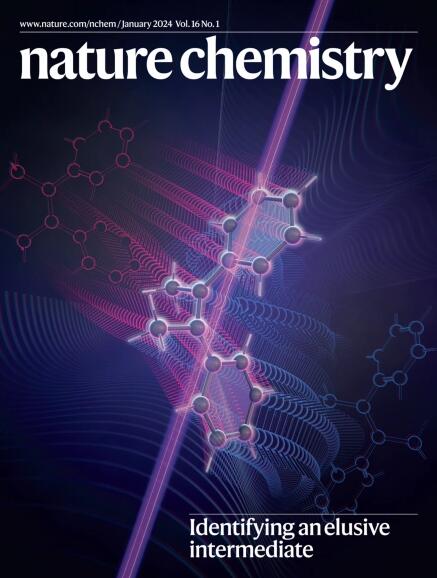自适应动态动力学分辨率使手性诱导随环尺寸的改变成为可能
IF 20.2
1区 化学
Q1 CHEMISTRY, MULTIDISCIPLINARY
引用次数: 0
摘要
动态动力学分辨(DKR)是一种有效的手性诱导策略,可将底物外消旋物的两种对映体转化为相同的光学富集产物。通常,产物的绝对构型应由手性催化剂决定。在这里,我们报告了一种适应性DKR策略,通过充分利用非对映氨基烷基环钯化配合物的动态相互转化,形成具有高立体化学选择性的多种氮杂环。值得注意的是,这种创新的自适应DKR模型通过改变环化产物的环尺寸,实现了用相同的手性二膦连接钯催化剂在连续立体中心的绝对构型的改变。此外,采用自适应DKR工艺作为手性锻造和支架构建的关键步骤,实现了简洁高效的马提尼酸全合成,进一步证明了该策略的有效性。本文章由计算机程序翻译,如有差异,请以英文原文为准。


Adaptive dynamic kinetic resolution enables alteration of chiral induction with ring sizes
Dynamic kinetic resolution (DKR) is an efficient chiral induction strategy that transforms both enantiomers of the substrate racemates into the same optically enriched product. Typically, the absolute configurations of the products should be determined by the chiral catalyst. Here we report an adaptive DKR strategy that forges diverse azapolycycles with high stereochemical selectivities by taking full advantage of the dynamic interconversion of diastereomeric aminoalkyl cyclopalladated complexes. Notably, this innovative adaptive DKR model achieves alterations of absolute configurations at the contiguous stereocentres with the same chiral diphosphine-ligated palladium catalyst by changing the ring sizes of the annulation products. Moreover, a concise and efficient total synthesis of martinellic acid was carried out by using the adaptive DKR process as the key chirality forging and scaffold establishment step, which further demonstrated the efficacy of this strategy. In drug development, altering the ring sizes and editing the stereochemistry of chiral heterocycle scaffolds in lead compounds are effective but challenging. Now an adaptive dynamic kinetic resolution strategy has been developed that enables the integration of multi-contiguous stereocentres and the assembly of complex polycycles such as martinellic acid.
求助全文
通过发布文献求助,成功后即可免费获取论文全文。
去求助
来源期刊

Nature chemistry
化学-化学综合
CiteScore
29.60
自引率
1.40%
发文量
226
审稿时长
1.7 months
期刊介绍:
Nature Chemistry is a monthly journal that publishes groundbreaking and significant research in all areas of chemistry. It covers traditional subjects such as analytical, inorganic, organic, and physical chemistry, as well as a wide range of other topics including catalysis, computational and theoretical chemistry, and environmental chemistry.
The journal also features interdisciplinary research at the interface of chemistry with biology, materials science, nanotechnology, and physics. Manuscripts detailing such multidisciplinary work are encouraged, as long as the central theme pertains to chemistry.
Aside from primary research, Nature Chemistry publishes review articles, news and views, research highlights from other journals, commentaries, book reviews, correspondence, and analysis of the broader chemical landscape. It also addresses crucial issues related to education, funding, policy, intellectual property, and the societal impact of chemistry.
Nature Chemistry is dedicated to ensuring the highest standards of original research through a fair and rigorous review process. It offers authors maximum visibility for their papers, access to a broad readership, exceptional copy editing and production standards, rapid publication, and independence from academic societies and other vested interests.
Overall, Nature Chemistry aims to be the authoritative voice of the global chemical community.
 求助内容:
求助内容: 应助结果提醒方式:
应助结果提醒方式:


